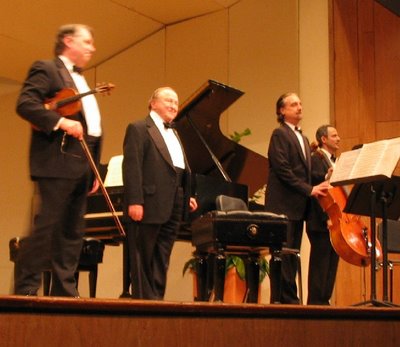Emersons and Pressler at Shriver Hall
 On Sunday's concert at Shriver Hall, it was topsy-turvy night, as members of the Emerson String Quartet joined forces with pianist Menahem Pressler, whom we heard earlier in the week with the Beaux Arts Trio at the Library of Congress. The Emerson's second violinist, Philip Setzer, played the sole violin part, ending up on the top of the ensemble (as he does sometimes, when the two violinists exchange seats), while first violinist Eugene Drucker played viola (in Lawrence Dutton's absence, as he recovers from shoulder surgery undergone in July). Wisely, Menahem Pressler and cellist David Finckel remained in their expected positions. Each half of the concert consisted of one long work, both monuments in the history of chamber music, which the very full auditorium audibly appreciated.
On Sunday's concert at Shriver Hall, it was topsy-turvy night, as members of the Emerson String Quartet joined forces with pianist Menahem Pressler, whom we heard earlier in the week with the Beaux Arts Trio at the Library of Congress. The Emerson's second violinist, Philip Setzer, played the sole violin part, ending up on the top of the ensemble (as he does sometimes, when the two violinists exchange seats), while first violinist Eugene Drucker played viola (in Lawrence Dutton's absence, as he recovers from shoulder surgery undergone in July). Wisely, Menahem Pressler and cellist David Finckel remained in their expected positions. Each half of the concert consisted of one long work, both monuments in the history of chamber music, which the very full auditorium audibly appreciated.
The first half was for the three Emersons only, Mozart's Divertimento in E-flat Major, K. 563, with Setzer and Drucker standing on either side of the seated Finckel. The piece seemed to get off to an uncertain start, perhaps due to under-rehearsing, although the long lines and phrasing were lovely. By the second movement, however, the performance came together, making sense of the strange harmonic vagaries with which Mozart experimented in the development. The substantial fourth movement, a theme and variations was superb, its sense of finality provoking a brief flurry of applause. The variation in the minor mode recalls the contrapuntal style of J. S. Bach and the searing suspensions of Corelli, showing the influence of Mozart's study of Baroque music in this period. (The divertimento was completed in 1788, but there is a similar Baroque moment in The Magic Flute, for example, in the duet by the Zwei Männer, "Der, welcher wandert diese Strasse.") The two minuets were cheery, and the finale had admirable rhythmic drive, with Philip Setzer acquitting himself well as the dominant voice.
Tim Smith, Emerson plus/minus (Baltimore Sun, October 17) |
Pressler is still technically impressive and able to cover dropped notes like an illusionist. Drucker brought a lyrical sound to the many solo moments in both the Mozart and Brahms viola parts, but he also seemed slightly unsure at moments, looking at the fingerboard to check his position when tuning was not quite right. The famous fourth movement of the Brahms quartet was a wild ride, playing on the feeling of Hungarian improvisatory folk music, speeding up and slowing down tempestuously. The second episode sounded appropriately Schumannesque -- Brahms stopped just short of actually plagiarizing the Davidsbündler theme -- and the coda was a heart-racing stampede. Jokingly, Philip Setzer introduced the encore with the remark, "Now that we're warmed up, we'd like to play..." The slow movement of the C minor piano quartet, op. 60 (based on the story of Werther), allowed the audience to recover its senses, in a tender, almost tortured outpouring of the emotions of the quintessential Romantic hero.
The next concert at Shriver Hall is a highly anticipated recital by pianist Hélène Grimaud (November 5, 5:30 pm). A review of her latest CD, Reflection, is forthcoming. The entire Emerson Quartet will hopefully be back in form for their three-concert series of Shostakovich quartets at the Kennedy Center on February 5 to 7, 2007.





















































No comments:
Post a Comment